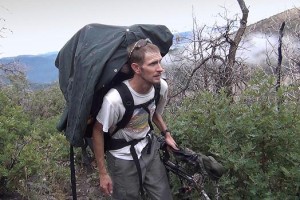
Bowhunting Tip: Weight is Everything
Be prepared. – Boy Scout Motto
Be prepared, not OVER-prepared. – My Motto
In this article I’m going to address weight issues. No, I’m not talking about your waiste line. I’m talking about unnecessary items we carry into the field that may be hampering our success.
Utah offers a great opportunity for bowhunters who still have unused archery tags at the end of the general elk and deer seasons. It’s called the Wasatch Extended Archery Hunt. The “extended hunt” runs from the middle of September through the end of December, and encompasses the entire Wasatch Front and the deer rut. I usually see more giant bucks during the extended hunt than the whole general season. The biggest downside to the extended hunt—particularly in November and December—is the steepness of terrain coupled with deep snow and cold weather.
In November of 2012, I hunted the extended hunt for a few days alone. There’s always a little apprehension about venturing into those freezing mountains alone; I really never know where I’ll end up exactly either. To feel more secure on that trip, I brought tons of extra gear, including extra clothing, food, water, hand warmers, boots, and even some reading materials. In other words I over-packed, and that was a big mistake. Instead of taking three hours to drag my sled to camp, it took five hours and I didn’t get to bed until 1:00 am.
For the duration of the trip, my legs cramped, I blew through my water, ate more food than usual, and was forced to rest more frequently. Although it was warmer than previous years, I was more tired and miserable. Miraculously I arrowed a decent buck two days in, but with so much camp weight on top of my deer, I had to leave half my gear on the mountain and return the next day to retrieve it. Not fun!
Extended Hunt Redo
In 2013 I returned to the same spot, only this time I brought my brain. Before the trip I went over the list of junk I hauled up the mountain last year and then crossed out almost half of it. Most of that extra stuff served only to make me feel safer and had no real use for hunting. Some of the items included extra food, water (I could just filter water as I went and /or eat snow), extra boots, a pillow, books, propane, extra knives, hand warmers, utensils, batteries, archery tools, a handgun, extra flashlights, lighters, etc.
I also noticed that my big, leather hunting belt weighed twice as much as my skinny “church belt,” so I wore that one instead. I even cut the tags off my clothes and the handle off my toothbrush. All in all, I probably removed 30% of my original pack weight, and man did it pay off. I got up the mountain in record time, ate less food, and covered more ground. You might be surprised at how difficult it is to be quiet while wearing a heavy day pack. In the end, I didn’t miss any of the junk I left home. Well, I did miss my handgun when I learned there was an active cougar den with kittens only 300 yards of my tent!
It’s hard to believe that such small items matter so much. It’s the result of the compounding effect. You never know which erroneous item will be the straw that breaks your back.
Weight and Snow Hunting
Weight is especially a negative factor when hunting in snow. More than anything else, a pair of heavy boots will fatigue you out in the snow. For years I had two boot options: First, a heavy, high-top, insulated cold-weather boot, and second, a lightweight, breathable, un-insulated stalker-style boot. In 20I3 I stopped using heavy boots altogether. What I found was the heavy boots always got too hot due to the extreme terrain. They were also noisy and very heavy compared to my stalker boots.
Now, the stalker boots weigh half as much (similar to tennis shoes), but there are two minor drawbacks. First, my feet always got cold when I wasn’t moving, and second, they had minimal traction, or tread. To counter the cold, I simply wore two layers of wool socks. As for traction, I simply strapped on a pair of lightweight ice cleats which worked wonders in the snow.
Conclusion
The next time you return from a grueling backcountry bowhunt, I suggest you empty everything in your backpack onto the living room floor and make a list of whatever you didn’t use. Is there still a tag on your tent? Why did you pack it into the woods? Were you going to eat it? Is there half a tube of toothpaste left in your toiletries pocket? Extra paste is a waste of space.
Weight is everything. That was the lesson I learned in 2013. And surprise, surprise, fear is your worst enemy. Fear is why we over-pack. The more afraid of the mountain we are, the more extra stuff we cram in our packs. And then there’s the great gear paradox: the more we fear failure, the more hunting gear we tend to carry around in our daypacks.
Bowhunters need to realize that they are the predator, not the gear on your back. You are too be feared, not the mountain. All that extra weight is an anchor keeping you from your goal. Pack light. Don’t be your own worst enemy. Be prepared, not over-prepared.
Click here for my Secret Bowhunting Tip #2: Success is a Decision

